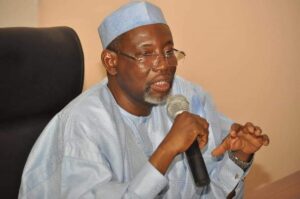FG, WHO deploy 82 core responders for emergency response in Nigeria
The Minister of Health, Dr Osagie Ehanire, has inaugurated the first batch of core responders to respond to emergencies within the first 24 to 48 hours of its occurrence.
At the graduation ceremony of the 82 core responders in Abuja on Friday, Ehanire said at least 100 emergencies occur across Africa per week, causing damage to health and economic systems.
The core responders were trained under the theme “Capacity Building, Learning and Training to On-Board the AVoHC Strengthening and Utilising Response Groups for Emergencies (SURGE) Team”.
According to Ehanire, there are public health emergencies that are already running quietly in the country.
“So our responsibility and our mandate goes beyond public health emergencies, which we are fully in support of, but there are others.
“We are losing up to 50,000 women every year in childbirth and that is a huge emergency. We are losing over 900,000 children every year.
“According to reports, we have 6,000 people killed in road traffic accidents every year and 17,000 from accidents who are maimed, permanently disabled every year. All of these are serious emergencies.”
He, however, said that the SURGE initiative promotes availability of equipment, well equipped teams with everything streamlined to respond to emergencies within the specified time frame.
He said they would also fully align with the concept of the resilient and sustainable health system for improved health outcomes and Universal Health Coverage.
He referred to it as a wealth of information that could turn around the detection and response time for emergencies within Nigeria and beyond.
The WHO Country Representative in Nigeria, Dr Walter Molumbo, said the organisation is committed to strengthening regional and sub national capacity to prepare and respond to public health emergencies in an increasingly globalised, unionised and connected world.
He added that people always being on the move was giving rise to an amplifying threat of multiple infectious hazards, in addition to natural disasters, conflict, climate change and other emergencies.
He said that the programme was aimed at providing national and subnational Rapid Response Teams (RRTs) with key knowledge and tools needed to detect and effectively respond to public health emergencies as they occur.
He explained that “the SURGE programme identified five countries among which Nigeria is being chosen and in Nigeria, we have six states that have been selected to kick-start this process.
“We will be able to scale up the SURGE in the six pilot states but also go beyond to make sure that the entire country benefits from this initiative.
“It is our hope that the country will truly build on this to make sure that we put in place the capacities that are truly needed to respond to future outbreak.
“We look forward to leveraging on data and innovation to create a community of practice where other countries who learn from what will be happening in Nigeria use the workforce we are developing to support other countries in Africa during the worst emergencies.”
The News Agency of Nigeria (NAN) reports that the six pilot states are Abia, Yobe, Kano, Lagos, Edo and the Federal Capital Territory.
Giving an overview of the programme, Dr Kumdisha Balami, the Field Epidemiologist of WHO, said that the initiative would build on existing infrastructure to put in place a well-organised support system that would augment government capacity when needed.
This, she said, would be by incorporating lessons from COVID-19, Ebola and other health emergencies.
She, however, said that there are centres of excellence across the continent to support the flagship initiative.
“We have the Centre for Data, Innovation and Intelligence in Senegal, Workforce Development in Kenya, Research and Development and Genomic Surveillance in South Africa.
“So, our topic of presentation today is on the response plan initiative, which is the SURGE and we have proposed to deploy at least 3000 African core responders that will be ready for response within 24 to 48 hours in the event of an emergency.
“For Nigeria, we proposed 350 core volunteers that will support emergency response in the country. So, as for today, we have about 82 who are ready to deploy in Nigeria.”
Balami, however, said that a collaborative approach which includes all agencies, sectors, government, partners to be on board under the support response was required to guarantee the success of the initiative.
The core responders were trained for five weeks on five modules.




